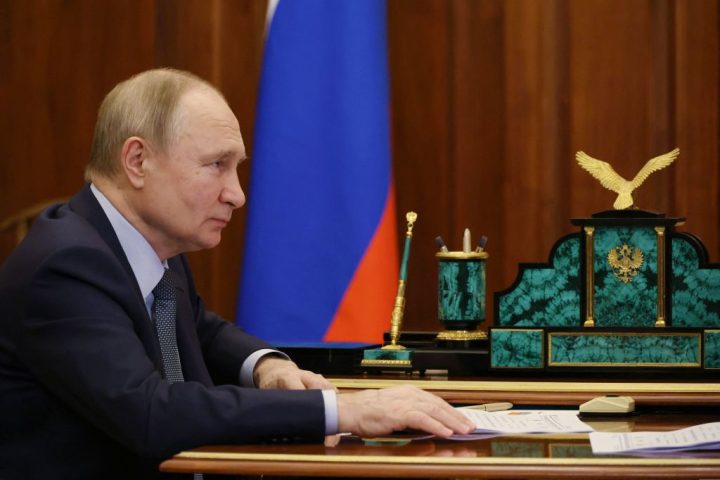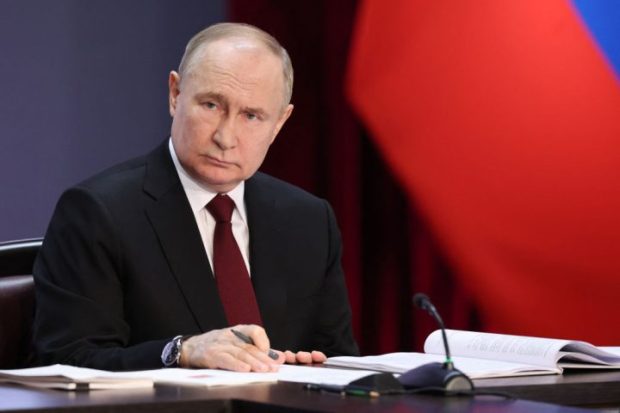They might not be the quick knock-out blow their champions misleadingly claimed they’d be, but sanctions are having a serious effect on the long-term viability of the Russian economy. However, we should never underestimate the Russians’ capacity to find rough and ready workarounds.
Back in Soviet times, I was regaled with stories of Lada cars being fixed with sticky tape and cast-off hosiery. Likewise, people would find ways around onerous bureaucracy and uncaring officialdom, whether turning to the black market or stealing from the state (as one told me, ‘only a fool buys a light bulb if he works in an office and can steal one’).
The West needs to constantly look at the ways Russians are finding loopholes and workarounds for sanctions
Since then, life has become more complex, and so too have the fixes. The effects of sanctions have led even the biggest beasts of the Russian state and corporate world to rise to the challenge. Denied access to Apple Pay and similar mobile payment systems, for example, major financial institutions like Alfa-Bank and the usually-stodgy Sberbank now provide customers with RFID stickers to put on the backs of their phones to allow contactless payments. Alternatively, shops’ payment terminals now generate QR codes that customers can scan with their phones to allow a direct transfer from their bank accounts. We should hardly be surprised: Russia has made strides in both e-commerce and e-government in recent years (the Moscow city administration’s online portal is pretty exemplary).
Of course, Russia is also home to a thriving transnational crime scene. They too are getting in on the action, and making a healthy profit in the process. Neighbouring Belarus would seem to have suddenly developed a passion for luxury foodstuffs. In practice, though, this is then repackaged and brought into Russia for sale to affluent consumers who don’t see why a war should constrain their culinary habits. Indeed, the safest and most lucrative smuggling racket, on a rouble-for-weight basis, is apparently smuggling Italian designed handbags and the like into the country. The girlfriends of oligarchs and kleptocrats do presumably still need their little luxuries.
However, there is also an intimate relationship between the state and the underworld in Russia. The Kremlin has long called on or pressganged gangsters into service as occasional auxiliaries, whether to whisk wanted agents back to the Motherland or gun down Chechen radicals in Istanbul and Berlin. No wonder they too are being mobilised in Putin’s war with the West.
Modern fridges and other white goods are being smuggled via Central Asia, not to grace Russian kitchens, but because their components can reportedly be cannibalised for military purposes. Likewise there are tales of older games consoles being bought up on eBay or in charity shops and brought into the country via Belarus for similar purposes (the word is that newer ones are hard to repurpose the same way). Accounts that Swedish speed cameras were being raided for optical components ending up in Russian drones have since been denied by the Swedish authorities, but other reports from the Balkans talk of a spate of thefts of high-end computer equipment of the sort now legally banned from export.
Of course, a defence industry cannot run off smuggled fridges and PlayStations. Arguably the even more serious Russian workarounds are the institutionalised money laundering and smuggling operations carried out with the connivance, or at least wilful blindness, of other states. Chinese banks have dramatically curtained their operations inside Russia to avoid themselves coming under sanctions but oligarchs and state enterprises alike continue to, in effect, launder their money through subsidiaries and intermediaries in the country.
Shiploads of stolen Ukrainian grain have been smuggled to North Africa and the Middle East. Criminal commodities from Afghan heroin to counterfeit cigarettes are sold across Europe to raise tens of millions of euros in off-the-books revenue. Gold from Russia and Russian-owned mines in Africa are illegally sold in the UAE through intermediaries.
Often, though, these workarounds need not be criminal. Discounted Russian oil flows around the world, for example, to be resold as domestic production. Turkey imports Russian crude that is then refined into diesel and sold into the EU. Malaysia, which had already been accused of laundering Venezuelan oil, produces some 400,000 barrels of oil a day – yet curiously manages to export 1.5 million barrels a day to China.
Individually, none of these activities do more than just moderate some of the most serious impacts of sanctions. Together, though, they demonstrate that Moscow has, like Iran and North Korea before it, learned the value of ingenuity and criminality in finding ways past even the most stringent of sanctions regimes. The West must accept that its economic war with Russia will be a long one. Not only that, but it needs to constantly be looking at the ways Russians are finding loopholes and workarounds, and be proactive in responding to them.
For more of The Spectator’s foreign coverage, check out our World section here.
Got something to add? Join the discussion and comment below.
Get 10 issues for just $10
Subscribe to The Spectator Australia today for the next 10 magazine issues, plus full online access, for just $10.




















Comments
Don't miss out
Join the conversation with other Spectator Australia readers. Subscribe to leave a comment.
SUBSCRIBEAlready a subscriber? Log in